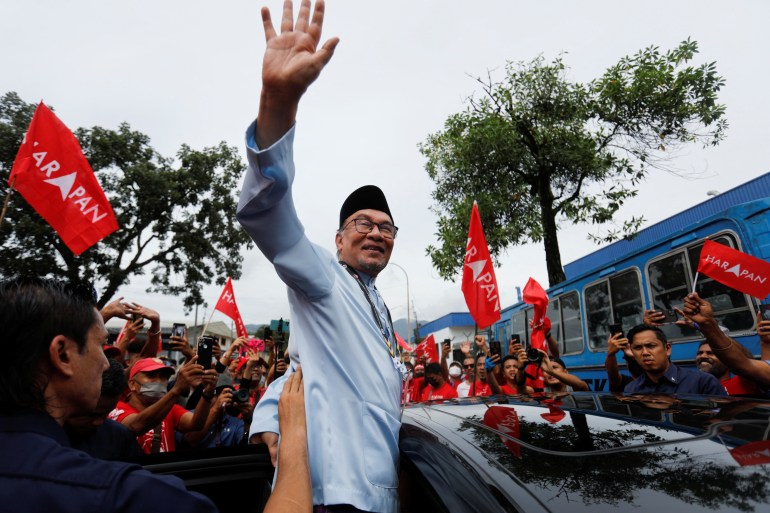Malaysia’s Anwar named prime minister after 25-year struggle
Veteran politician finally secures top post after inconclusive election led to days of haggling and monarch’s intervention.

Anwar Ibrahim has been named Malaysia’s new prime minister, marking an incredible comeback for a man who was first lined up for the job in the boom years of the 1990s before he was suddenly sacked and jailed.
Anwar’s Pakatan Harapan (PH) coalition won the most seats in the weekend’s election, but no one party or coalition emerged with the 112 seat parliamentary majority necessary to form a government.
With neither able to make a breakthrough, King Sultan Abdullah Sultan Ahmad Shah met Anwar and Muhyiddin, as well as newly elected members of parliament to canvas their views on who should lead the new government.
After a meeting of the royal households on Thursday, the king announced that Anwar would become prime minister because he had the support of the majority of Malaysia’s 222 members of parliament.
The PH coalition made up of Anwar’s Keadilan party, the Democratic Action Party, Amanah and the youth party MUDA celebrate winning the most seats in Saturday’s election [Hasnoor Hussain/Reuters[
There are “no absolute winners and no absolute losers,” he said in the statement, urging all politicians to work together for the benefit of the country.
King Sultan Abdullah said the 75-year-old opposition leader would be sworn in at a ceremony at the palace at 5pm (09:00 GMT).
“It is a long time coming for Anwar,” Asrul Hadi Abdullah Sani, the deputy managing director at consultancy BGA Malaysia, told Al Jazeera. “All his struggles and campaigns for reform are now vindicated.”
Sodomy charges
Anwar Ibrahim started his political career as a student activist, founding the Muslim Youth Movement of Malaysia, known by its Malay acronym ABIM, in 1971 and later leading protests against rural poverty and on other socioeconomic causes.
His activism caught the eye of then-Prime Minister Mahathir Mohamad who persuaded him to join the United Malays National Organisation (UMNO), the dominant party in BN, which had ruled Malaysia since independence in 1957.
Anwar rose rapidly through the ranks to become finance minister and deputy prime minister, earning a reputation as a charismatic, ambitious and reform-minded politician.
But as the Asian financial crisis deepened, Mahathir turned on the man he had chosen as his successor.
In September 1998, Anwar was sacked and accused of corruption and sodomy, a crime in Malaysia.
Thousands took to the streets of Kuala Lumpur and Anwar, who maintained the charges were politically motivated, was arrested.
His trial veered from the shocking – a black eye later confirmed to be inflicted by the then-police chief while Anwar was in custody – to the absurd – a stained mattress hauled into court as evidence.
Anwar Ibrahim’s sacking in 1998 and then trial on charges of corruption and sodomy kickstarted Malaysia’s reform movement [File: Andy Wong/AP Photo]
After being found guilty, Anwar was released in 2004 and a second sodomy trial followed as the reform movement that had begun with his 1998 downfall gathered momentum.
In all, Anwar spent some 10 years in prison before he was finally pardoned and released in 2018.
By that time he had once again joined forces with Mahathir – under the PH banner – in a bid to ensure BN was punished at the ballot box for the multibillion dollar scandal at state fund 1MDB.
But Anwar’s route to the top was again thwarted when Mahathir wavered on his promise to hand over power and the PH government collapsed amid infighting and pressure from Malay-Muslim conservatives.
-al jazeera







